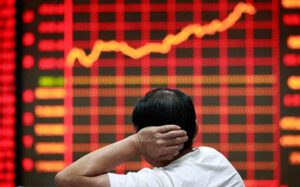
Stock indices of the largest Asia-Pacific countries do not show the same dynamics during the trading on Monday.
The positive factor for the Chinese stock market is the news about the gradual lifting of anti-hygienic restrictions in the country, writes Trading Economics.
Meanwhile, China’s service sector business activity index fell to 46.7 points in November from 48.4 points a month earlier, the purchasing managers index (PMI) calculated by Caixin Media and S&P Global showed. Thus, it declined for the third month in a row.
The PMI value above the 50-point mark indicates growth of activity in the sector, while below it indicates its weakening. Analysts on average expected a less significant drop in the index to 47 points, according to Trading Economics.
China’s Shanghai Composite index was up 1.5 percent by 7:27 a.m. and had surpassed the 3,200-point mark for the first time in more than two months. Hong Kong Hang Seng indicator jumped 3.2%.
The shares of Alibaba Health Information Technology Ltd., which provides IT services in medical sphere, showed the most significant increase of 18.3% on the Hong Kong Stock Exchange.
In addition, developer Sands China (SPB: 1928) and Longfor Group gained 14% and 8.8%, respectively, while restaurant chain owner Haidilao International Holding Ltd. – by 10.9%, consumer electronics maker Xiaomi (SPB: 1810) by 8.1% and Internet company Baidu by 7.9%.
Retailers Alibaba (SPB: BABA) and JD.com Inc. (SPB: JD) were up 5.2% and 7.5%, respectively, telecoms China Unicom and China Telecom (SPB: 728) up 6.4% and 4.5%.
In Shanghai, airlines including Air China (+1.9%), China Eastern Airlines (SPB: 670) (+4%) and China Southern Airlines (SPB: 1055) (+3.2%), alcohol producer Kweichow Moutai (+1.9%) and China Tourism Group Duty Free Corp. (+2.2%) are rising their share prices.
The value of Japan’s Nikkei 225 is around the level of Friday’s closing trading.
The top gainers among the index components are shares of pharmaceutical Eisai (+4.7%), cosmetics company Shiseido (+2.9%) and clothing retailer Fast Retailing (+2.8%).
Meanwhile, car makers Nissan Motor (-2.8%) and Isuzu Motors (-2.5%), optics makers Olympus Corp. (-3.4%) and Nikon Corp. (-2.7%) were falling in price.
South Korea’s Kospi Index was down 0.8% by 8:15 a.m. Moscow timeframe.
The stock quotes of one of the world’s largest chip and electronics maker Samsung Electronics Co. plunged 0.3%, automaker Hyundai Motor – 2.7%.
Australian S&P/ASX 200 index added 0.5%.
Share prices of the world’s largest mining companies BHP and Rio Tinto jumped by 2.7% and 3.9%, respectively.
At the same time the price of securities of Elders Ltd. providing services in the agricultural industry fell by 4.2% after UBS analysts worsened recommendations for them to “neutral level” from “buy”.
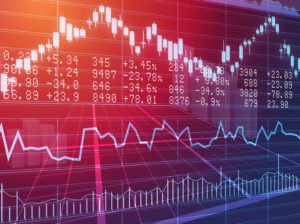
Equity markets in the Asia-Pacific region (APAC) are down in trading on Friday.
Investors are waiting for more clarity from Chinese authorities after Beijing signaled it was easing a series of tough restrictions against the spread of the coronavirus infection, CNBC writes.
Several major Chinese cities have announced easing of anti-covirus measures. Guangzhou, Shijiazhuang and Chengdu relaxed requirements for the regularity of tests for COVID-19 and the movement of citizens, Bloomberg reported. Markets and public transportation began operating in some areas. In Beijing, sick people are allowed to stay at home instead of being isolated in special centers.
Japan’s Nikkei 225 was down 1.7 percent by 7:11 a.m. Ksk. At a certain point in trading the indicator fell to a three-week low, Trading Economics said.
Shares of automaker Mitsubishi Motors Corp. (-5.6%), bearings and cardan shafts maker NTN Corp. (-5.3%) and electric cables maker Fujikura Ltd. (-4.3%) act as leaders in the decline among index components.
Moreover, shares of such big companies as SoftBank Group (-0.3%), Sony Group Corp. (-1.3%), Fast Retailing Co. (-2.3%) also declined.
China’s Shanghai Composite had lost 0.3% by 7:16 a.m. Ksk, Hong Kong’s Hang Seng had lost 0.6%.
Investors fix profits after a confident rally associated with the softening of the PRC’s position on the anti-covids restrictions, writes Trading Economics.
The most significant decline in quotations on the Hong Kong Stock Exchange is shown by shares of developers Country Garden Holdings Co. Ltd. (-6.4%), Country Garden Services Holdings Co. Ltd. (-5.6%) and Longfor Group Holdings Ltd. (-5.4%).
South Korea’s Kospi index was down 1.4 percent by 7:14 a.m. kk.
One of the world’s biggest chip and electronics maker Samsung Electronics Co. was down 2.9 percent, while car maker Hyundai Motor slid 1.5 percent.
Consumer prices in South Korea rose 5 percent year on year in November, the slowest pace since April 2022, after rising 5.7 percent a month earlier, data from the country’s statistics agency showed. Analysts on average had expected inflation in the country to be 5.1 percent, Trading Economics wrote.
On a monthly basis, consumer prices in November fell by 0.1% after rising 0.3% a month earlier.
The Australian S&P/ASX 200 index lost 0.7% in trading on Friday.
Retail sales in Australia fell 0.2% month-on-month in October, compared with an increase of 0.6% a month earlier, official statistics showed.
This is the first decline in the current year. It is due to the fact that price pressures and rising interest rates have begun to have a negative impact on consumer spending, according to Trading Economics.
Share prices of the world’s largest mining companies BHP and Rio Tinto fell by 1.6% and 1.1%, respectively.
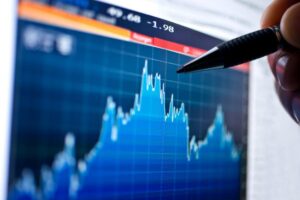
Equity markets in the Asia-Pacific region are rising in trading Thursday, following a significant rise in U.S. stock indices.
Investors are assessing the speech of Federal Reserve (Fed) Chairman Jerome Powell.
He said the U.S. central bank could slow the pace of interest rate hikes following its December meeting. “The time to moderate the pace of rate hikes may come as early as the next meeting,” Powell said during a speech at the Brookings Institution on Wednesday.
In doing so, the Fed chief tried to balance those words with “hawkish” signals, Market Watch notes. Among other things, he said that the final peak in rates should be higher than might have been expected months ago.
In addition, Powell made it clear that the question of a rate cut is irrelevant at this point. “History strongly cautions us against premature policy easing,” he said.
The news from China also had a positive effect on bidders’ sentiment.
Authorities in Guangzhou have lifted restrictions imposed in several areas to combat the spread of the coronavirus. Strict lockdown was in force for several weeks in the city with a population of more than 18 million people, businesses were closed and strict quarantine measures were in place for those who were sick and in contact with them.
China’s Shanghai Composite index was up 0.7 percent by 7:26 a.m. Ksk, while Hong Kong’s Hang Seng was up 1.45 percent.
Shares in Shenzhou International Group, which makes and sells knitwear, rose 9 percent, the jewelry chain Chow Tai Fook Jewellery Group Ltd. – by 6.6% and the Internet company Baidu by 5%.
In addition, retailers Alibaba and JD.com Inc. – rose by 4.3% and 1.5%, respectively, telecoms China Unicom and China Telecom – by 4.6% and 2.2%.
Japan’s Nikkei 225 was up 1.1% by 8:21 a.m. Ksk.
Among the index components, pharmaceutical Eisai (+4.7%), chipmaker Advantest (+4.3%) and cosmetics maker Shiseido (+4.1%) were the biggest gainers.
Moreover, SoftBank Group (+1.8%), Sony (+0.9%) and Fast Retailing (+2.8%) gained their share prices.
South Korea’s Kospi Index was up 0.3% by 8:21 a.m. Ksk.
One of the world’s biggest chip and electronics maker Samsung Electronics Co. gained 0.5% and automaker Hyundai Motor rose 0.9%.
South Korea’s economy grew 3.1 percent in the third quarter of 2022 compared with the same period last year, final data from the Bank of Korea showed. Compared to the second quarter, GDP increased by 0.3%, which was the smallest rate of increase for the year.
The dynamics of both indicators matched both the previously announced data and analysts’ forecasts.
Australia’s S&P/ASX 200 index added nearly 1% in trading Thursday.
Share prices of the world’s largest mining companies BHP and Rio Tinto rose by 2.1% and 3.3%, respectively.
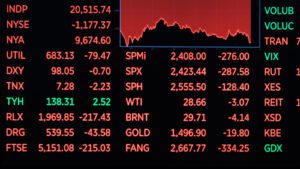
Traders are waiting for the speech of the head of the U.S. Federal Reserve (Fed) Jerome Powell, which will be held on Wednesday evening, as well as assess statistical data from China and follow the news about the restrictions related to the spread of coronavirus infection in the country, and large-scale protests against them.
Chinese authorities the previous day announced plans to more actively vaccinate the elderly population against the coronavirus, shortening the time between vaccinations for those over 80 years old to three months.
The Shanghai Composite stock index was up 0.06% by 7:22 a.m. KSC and the Hang Seng of Hong Kong was up 0.8%.
China’s Purchasing Managers’ Index (PMI) for the manufacturing industry fell to 48 points in November from 49.2 points a month earlier, the fastest pace since April, data from China’s State Bureau of Statistics (SBS) showed.
Experts on average had expected it to drop to 49 points, Trading Economics noted.
The service sector PMI fell to 46.7 points in November, also the fastest pace since April. In October, its value was 48.7 points.
Growth leaders in Hong Kong are shares of automaker Geely Automobile Holdings Ltd. (+8.6%), telecom China Unicom Ltd. (+6.25%) and restaurant chain owner Haidilao International Holding Ltd. (+3.7%).
Japan’s Nikkei 225 stock index was losing 0.35% by 7:22 a.m. KSC.
Japan’s industrial output fell 2.6% in October compared to the previous month, preliminary statistical data showed. The decline in industrial production was recorded for the second month in a row. In September the index decreased by 1.7%.
Experts on average expected a decrease in industrial production in October by 1.5%, according to Trading Economics.
Leaders of the decline are securities of Tokyo Electric Power Co. Holdings Inc. (-3.3%), construction materials producer Sumitomo Osaka Cement Co. Ltd. (-3.3%) and game developer Konami Group Corp. (-2.9%).
South Korea’s KOSPI was up 1.1% by 7:24 a.m. KSC.
South Korean industrial production fell 3.5% month-over-month in October. The rate of decline was the fastest since May 2020. In September, the figure was down 1.9%. Experts had forecast a 1% decline in industrial production in October.
Retail sales in the country fell 0.2% in October relative to the previous month after falling 1.9% in September.
Shares of the world’s biggest chip and consumer electronics maker Samsung Electronics Co. rose 1.5% and automaker Hyundai Motor Co. rose 0.3%.
Australia’s S&P/ASX 200 index added 0.4% on Wednesday.
Australia’s consumer price index (CPI) rose 6.9% year on year in October, official data showed. The rate of growth slowed from a 7.3 percent rise in September, which was the highest since at least September 2018, Trading Economics wrote.
Experts on average had predicted a 7.4% rise in the index.
Share prices of the world’s largest mining companies BHP and Rio Tinto rose by 1.6% and 1.7%, respectively.
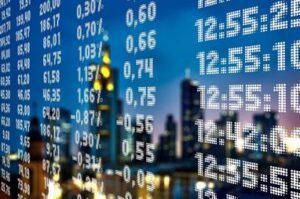
Asia-Pacific region (APR) stock indices are steadily rising on Tuesday, with the exception of the Japanese indicator.
The markets of China and Hong Kong are rising following a jump in developer shares after restrictions on the sector were eased the day before.
China Securities Regulatory Commission (CSRC) said on Monday it had lifted a multi-year ban on listed developers to sell shares in the domestic market in order to raise funds to pay debts and M&A deals.
The decision was made to support a “stable and sustainable” development of the sector, the CSRC said.
“These measures are likely to accelerate the consolidation of real estate companies,” said China Index Holdings expert Liu Shui.
Shares of major Chinese real estate developer Country Garden Holdings Co. jumped 8.2 percent in Hong Kong trading.
China Vanke gained 12.2% in Hong Kong and 10% in Shenzhen, Gemdale gained 5.1% and 10% in Hong Kong and Shanghai respectively and Greenland Holdings gained 5.3% and 10%.
The Shanghai Composite stock index rose 2% in trading, the Shenzhen Composite rose 2.2% and Hong Kong’s Hang Seng gained 4%.
The Chinese market is also supported by growing expectations of traders that Beijing will ease quarantine restrictions after last weekend’s mass protests in the country.
“Expectations are growing that China’s zero-tolerance COVID-19 policy is over, and that’s improving traders’ sentiment,” notes Kiyong Song, a Societe Generale analyst in Hong Kong, cited by Bloomberg.
The value of securities of Chinese alcohol producer Kweichow Moutai rose by 5.4%. On the eve, the company announced its intention to pay a special dividend of 21.91 yuan ($3.06) for the first time since its shares were listed on the stock exchange in 2001.
Japan’s Nikkei 225 stock index was losing 0.5 percent in trading amid weak statistical data.
Japan’s retail sales rose in October for the eighth month in a row, but the rate of increase slowed compared to September and was worse than analysts’ expectations.
According to the Ministry of Economy, Trade and Industry, retail sales rose 4.3% last month compared with October 2021. They were up 4.8% in September. Experts polled by Trading Economics predicted an average increase of 5 percent.
Retail sales rose 0.2% from the previous month after climbing 1.5% in September.
Unemployment in Japan in October remained at 2.6%, while analysts expected its reduction to 2.5%.
Leaders of the decrease are shares of technological companies: SoftBank Group securities fell by 1.4%, Tokyo Electron – by 1.2%, Keyence Corp. – by 1.6% and Advantest – by 1.7%.
Shares of Toyota Motor (-1.2%), Sony Group (-1%), Mitsubishi Corp. (-0.9%) also fell in price.
The Australian S&P/ASX 200 added 0.3% on Tuesday, while South Korea’s KOSPI gained 0.9%.
BHP Group shares gained 2.1%, Rio Tinto – 3.5% and Pilbara Minerals – 1.6%.
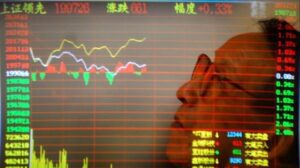
Equity markets in the Asia-Pacific region are mainly rising in trading on Thursday, following the dynamics of U.S. indices at the close of trading in the United States.
Investors were optimistic about the published minutes of the November meeting of the U.S. Federal Reserve System. It is clear from the document that the vast majority of U.S. Central Bank executives support the view that the pace of base interest rate hike should slow down in the near future.
At the same time, the negative factor for the Asian stock markets is the uncertainty about the degree of strictness of the anti-covalent restrictions in China due to the new outbreak of coronavirus in the country.
“Asian markets are under pressure from the COVID-19 situation in China, where investors appear to be shunning local assets and commodities as the country faces a near-record number of coronavirus cases. Large-scale (anti-coVID – IF) restrictions will continue to adversely affect risk appetite and constrain macroeconomic indicators,” said ActivTrades analyst Anderson Alves.
Hong Kong’s Hang Seng Index was up 0.54% by 7:15 a.m. ksk, while Shanghai’s Shanghai Composite was down 0.1%.
The most significant rise on the Hong Kong Stock Exchange is shown by securities of Chinese real estate development companies: shares of Country Garden Holdings Co. Ltd. are up nearly 12%, Longfor Group Holdings Ltd. – by 9.3 percent and China Vanke Co. – up 4.5%. Traders reacted positively to messages from Chinese banks, including Bank of China Ltd., Agricultural Bank of China Ltd. and Bank of Communications Co. about their provision of new credit lines to developers.
Meanwhile, share prices of electronics maker Xiaomi Corp. are down 4 percent. The company unexpectedly posted a net loss in the third quarter and cut revenue by almost 10% on weakening demand for smartphones worldwide.
Japan’s Nikkei was up 1.1% by 7:20 a.m. Ksk.
Among the index components, IT company CyberAgent Inc. (+8.3%), logistics company Nippon Yusen K.K. (+6.1%) and energy company Tokyo Electric Power Co. Holdings Inc. Shares of semiconductor maker Advantest Corp. (+4.5%), online game developer NEXON Co. (+4%) and electronics equipment maker Tokyo Electron Ltd. (+3.7%) are also up actively.
South Korea’s Kospi Index was up 0.9 percent by 7:25 a.m. Ksk.
One of the world’s biggest chip and electronics maker Samsung Electronics Co. was up 0.7% and automaker Hyundai Motor rose 0.6%.
The Bank of Korea raised its key interest rate by 25 basis points to 3.25 percent a year at the end of Thursday’s meeting, the regulator said in a statement. Thus the South Korean Central Bank slowed the pace of tightening of monetary policy compared to October, when the rate was raised by 50 bps.
Australian S&P/ASX 200 index added 0.3%.
Share prices of the world’s largest mining companies BHP and Rio Tinto rose by 1.6% and 1.4%, respectively.